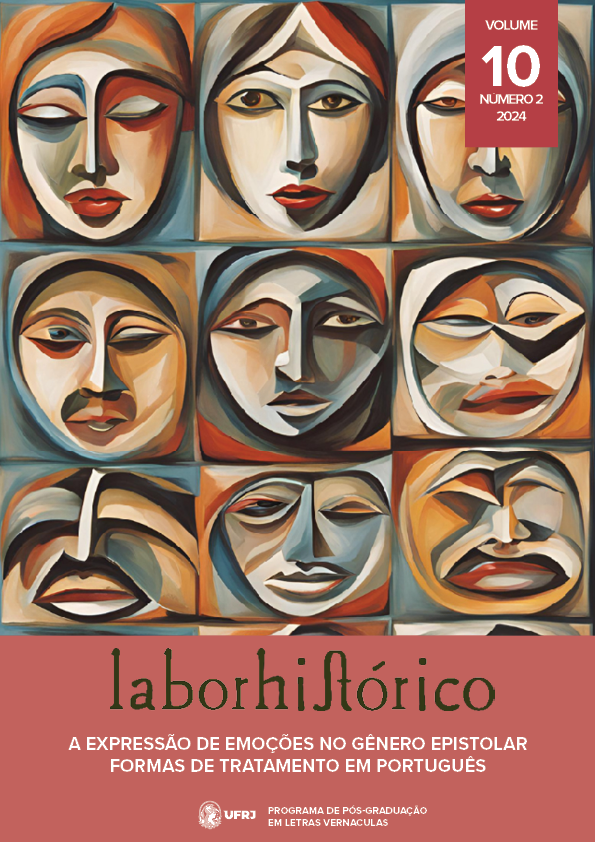Slavery, faith and public management: philological editions of a letter dated from the 18th century and analysis of the construction of the ethos of the viceking, count of vimieiro.
DOI:
https://doi.org/10.24206/lh.v10i2.42373Keywords:
Letter, Colonial Bahia, Ethos, Philology, SlaveryAbstract
Letters are communication instruments widely used over time, both in personal and administrative spheres, in both the public and private spheres. The manuscript selected, read and edited here belongs to the collection of the Ultramarine Historical Archive, cataloged by the Projeto Resgate Barão do Rio Branco and made available at the National Digital Library. It is a letter written in Bahia, in 1719, sent to the king of Portugal, D. João V, written by the Count of Vimieiro, title of the Portuguese D. Sancho de Faro e Sousa, who was viceroy and governor-general of Brazil for just over a year, between August 1718 and October 1719, when he died. To provide greater access to different reader profiles, a semidiplomatic edition is offered, which follows conservative criteria, accompanied by an interpretative edition, which meets the interests of non-specialist readers. The study also consists of contextualization that discusses aspects of the 18th century slave society and analysis of aspects related to enunciation, in order to demonstrate how subjectivity can be highlighted, even in a document of an administrative nature. Therefore, the enunciative scene is analyzed, highlighting the construction of ethos, a set of attributes constructed in and by discourse. In the letter, the enunciator seeks to persuade the reader of his qualities as manager of the State of Brazil, and about his character as a good and pious Christian, concerned with the degrading situation of elderly or sick enslaved people.
References
ARISTÓTELES. Retórica. Tradução e notas Edson Bini. São Paulo: EDIPRO, 2011.
BELLOTO, Heloísa Liberalli. Como fazer análise diplomática e análise tipológica de documento de arquivo. São Paulo: Arquivo do Estado; Imprensa Oficial do Estado, 2002.
BLUTEAU, Rafael. Vocabulário portuguez e latino. Coimbra: Colégio das Artes da Companhia de Jesus, 1712-1728. Disponível em: https://www.bbm.usp.br/pt-br/dicionarios Acesso em: 26 dez. 2023.
CARTA do vice-rei e governador-general do Brasil, D. Sancho de Faro e Sousa, conde de Vimieiro, ao rei, D. João V, sobre os escravos velhos ou incapacitados que são desprezados por seus senhores. Arquivo Histórico Ultramarino, Projeto Resgate, Bahia – Avulsos (1604-1828), doc. 1047. Cx. 12, 1719. Disponível em: https://resgate.bn.br/docreader/DocReader.aspx?bib=005_BA_AV&Pesq=escravos&pagfis=8315 Acesso em: 11 set. 2023.
DUARTE, L. F. Glossário de Crítica Textual. Universidade Nova de Lisboa, 2007. Disponível em: http://www2.fcsh.unl.pt/invest/glossario/glossario.htm. Acesso em 05 dez. 2023.
FERREIRA, Luiz Antonio. Leitura e Persuasão: princípios de análise retórica. São Paulo: Contexto, 2010.
FERREIRA, Luiz Antonio. Introdução: Inteligência retórica e vocalidade: constituição e manutenção do ethos. In: FERREIRA, Luiz Antonio (org.). Inteligência retórica: o ethos. SP: Blucher, 2019. p.10-24.
MAINGUENEAU, D. A propósito do ethos. In: MOTTA, Ana Raquel; SALGADO, Luciana (org.). Ethos discursivo. SP: Contexto, 2008. p. 11-29.
MAINGUENEAU, D. Análise de textos de comunicação. São Paulo: Cortez, 2002.
MAINGUENEAU, D. Ethos, cenografia, incorporação. In: AMOSSY, Ruth (org.). Imagens de si no discurso: a construção do ethos. SP: Contexto, 2005. p. 69-92.
NASCIMENTO, Abdias do. Escravidão: o mito do senhor benevolente. In: NASCIMENTO, Abdias do. O genocídio do negro brasileiro: processo de um racismo mascarado. 3.ed. São Paulo: Perspectiva, 2016. p. 57-72.
NUNES, Antonietta d’Aguiar. História baiana: dos tempos pré-históricos ao Brasil reino. 2.ed. Simões Filho, BA: Kalango, 2017.
PEREIRA, Norma S. da Silva. Fontes coloniais e escravidão: relações de trabalho e práticas culturais na América portuguesa Filol. Linguíst. Port., São Paulo, v. 22, n. Esp., p. 113-129, dez. 2020. Disponível em: https://www.revistas.usp.br/flp/article/view/166012 Acesso em: 26 dez. 2023.
SCHWARTZ, Stuart B. A população escrava na Bahia. In: SCHWARTZ, Stuart B. Segredos internos: engenhos e escravos na sociedade colonial 1550-1835. Trad. Laura Teixeira Motta. São Paulo: Companhia das Letras; 1988. p. 280-309.
SILVA JÚNIOR, Carlos. Tráfico, escravidão e comércio em Salvador do século XVIII: a vida de Francisco Gonçalves Dantas. In: REIS, João José; AZEVEDO, Elciene. (org.). Escravidão e suas sombras (1699-1738). Salvador: EDUFBA, 2012. p. 143-185.
TAVARES, L. H. Dias. História da Bahia. São Paulo: EDUNESP; Salvador: EDUFBA, 2001.
TELLES, C. M. A chamada lição conservadora na edição de textos. Scripta Philologica, Feira de Santana (BA), n. 5, p. 253-266, 2009.
TOLEDO NETO, Sílvio de Almeida. Um caminho de retorno como base: proposta de normas de transcrição para textos manuscritos do passado. Travessias Interativas, São Cristóvão, SE, v. 10, n. 20, p. 192–208, 2020. DOI: 10.51951/ti.v10i20. Disponível em: https://periodicos.ufs.br/Travessias/article/view/13959. Acesso em: 30 out. 2023.
VASCONCELOS, Pedro de Almeida. A idade do ouro de Salvador: riqueza e religiosidade (1650-1763). In: VASCONCELOS, P. A. Salvador: transformações e permanências (1549-1999). 2.ed. Salvador: EDUFBA, 2016. p. 77-134.
VIDE, Sebastião Monteiro da. Constituições primeiras do Arcebispado da Bahia. Brasília: Senado Federal, Conselho Editorial, 2011 [1853].
Downloads
Published
Issue
Section
License
Copyright (c) 2024 Norma Suely Silva Pereira, Gilberto Sobral

This work is licensed under a Creative Commons Attribution-NonCommercial 4.0 International License.
Authors who publish with this journal agree to the following:
a. The authors hold copyright of the published papers; authors are the sole responsible party for published papers content; the published paper is licensed under a Creative Commons Attribution-NonCommercial 4.0 International License which allows the sharing of the publication as long as there is acknowledgement of authorship and publishing by Revista LaborHistórico.
b. Authors should seek previous permission from the journal in order to publish their articles as book chapters. Such publications should acknowledge first publishing by LaborHistórico.
c. Authors may publish and distribute their papers (for example, at institutional repositories, author's sites) at any time during or after the editorial process by Revista LaborHistórico.


